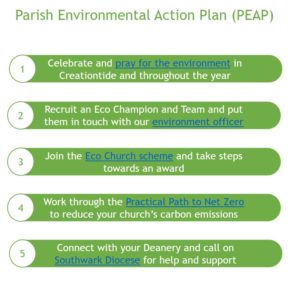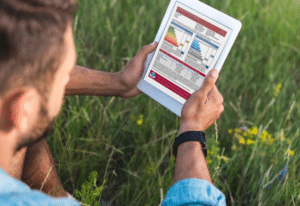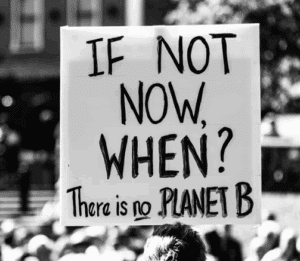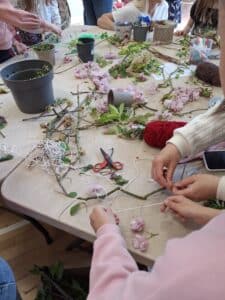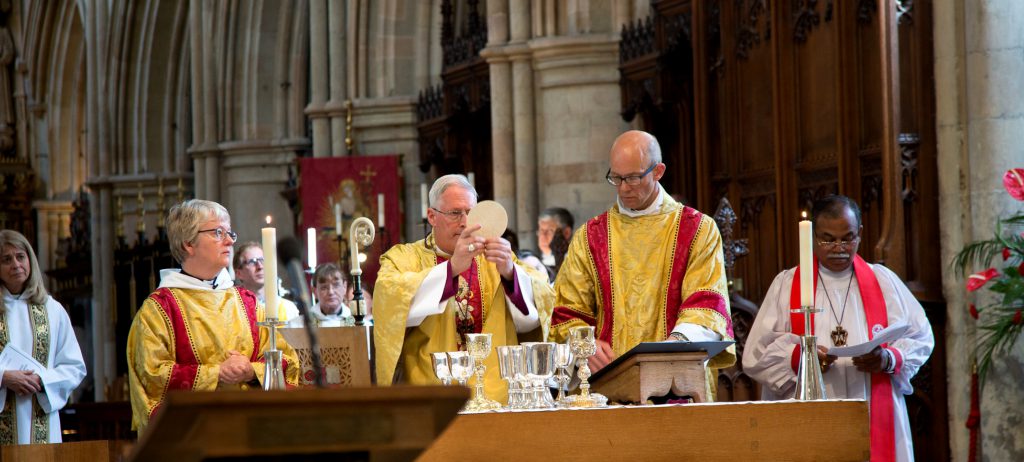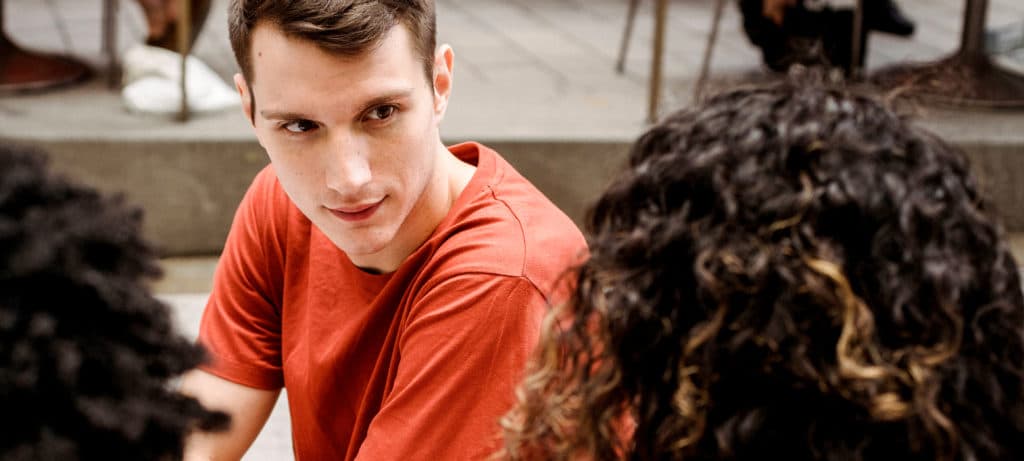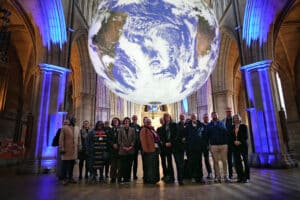
The Fifth Mark of Mission: To strive to safeguard the integrity of creation, and sustain and renew the life of the earth
Our Commitment
As an Eco Diocese we are committed to weaving care for God’s creation through all we do. We recognise that it is a missional imperative to safeguard the earth entrusted to us and live out our faith through our daily actions, responding to the urgency of the climate and nature crises. We invite you to join us on this journey.
Read our Environment Policy
Sign up our Eco Bulletin
On this page you will find a range of environmental resources. We would love to support you in taking action, so please contact us if you have any questions or would like further advice or ideas.
Let us know what you’re up to in your church, either by email or on social media #EcoSouthwark @SouthwarkCofE.
Read our Eco Bulletin
Sign up for our Eco Bulletin, and read past issues...
Sign up for our Eco Bulletin here
Eco Bulletin January 2026
Download FileEco Bulletin November 2025
Download FileEco Bulletin September 2025
Download FileEco Bulletin July 2025
Download FileEco Bulletin May 2025
Download FileEco Bulletin March 2025
Download FileEco Bulletin January 2025
Download FileEco Bulletin November 2024
Download FileHow are we taking action?
Eco Church
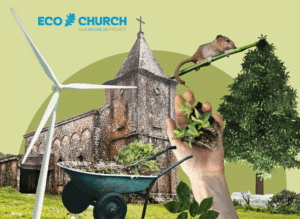
We encourage all churches to register for A Rocha’s Eco Church scheme. It is easy and free to register with the scheme, which provides a framework for environmental action in different areas of church life.
By answering the questions in the Eco Church survey, churches can see what they are already doing well and get a clear sense of what steps to take next.
The questionnaire is divided into five key areas, making it easy for different church members to take responsibility for filling in different sections. These are:
- worship and teaching
- buildings
- land
- community and global engagement
- lifestyle
Don’t be put off by the length! Enjoy a cup of tea while filling it in, and use the ‘don’t know’ box wherever necessary.
By taking some simple actions and regularly updating the Eco Church answers, churches are frequently surprised to discover how quickly they qualify for the Bronze Eco Church Award. There are also a fantastic range of resources available on A Rocha’s website to help you with each section of the survey.
You can reach out to our Diocesan Environmental Officer or your area Eco Champion for further support with the scheme.
Webinar: Getting started – an introduction to and overview of Eco Church
Webinar: Working towards an award and maintaining momentum
Eco Diocese
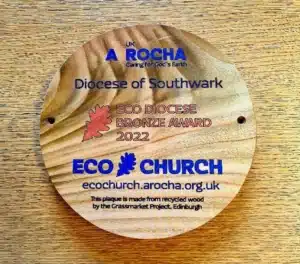
At the July Synod in 2019, the Diocese of Southwark voted unanimously to work towards becoming an Eco Diocese. At the start of summer 2022, we were awarded the A Rocha Bronze Eco Diocese award.
Our Diocese is now working towards achieving Eco Diocese Silver status by 2027/8. Our pledge reflects our commitment to climate justice and loving our local and global neighbours, and to the fifth Mark of Mission: safeguarding the integrity of creation and sustaining and renewing the life of the earth.
The Eco Diocese framework is provided by the A Rocha charity, which also offers the Eco Church scheme for individual churches.
Working towards Net Zero Carbon
In February 2020, the Church of England General Synod passed a motion recognising the climate emergency and calling on all parts of the Church to reduce their emissions year-on-year, aiming for a target of net zero emissions by 2030. A ‘Routemap’ outlining a plan to reach this target was then approved in 2022.
The Church of England has some excellent resources for churches aiming to reduce their energy usage, including a Practical Guide outlining a step by step process. There is also faculty guidance, heating checklists, webinars, funding advice, case studies, and other resources. You can also read this blog by our former Church Buildings Officer.
Watch: New LED lighting at Immanuel and St Andrew Streatham
Watch: Reducing energy use at St Francis Selsdon
Resources for churches and deaneries
We aim to provide support for churches at every stage of their environmental journey. If you don’t see the information you need, please get in touch.
Getting started
Parish Environmental Action Plan
Want to get involved but not sure where to start? Have a read of our starter document: Ways of starting your church’s eco journey. and check out the 5 step Parish Environmental Action Plan (PEAP) below.
Foundations for Creation Care

If you feel called to care for God’s world but want some foundation-level training to support you in your journey – consider joining one of our Foundations for Creation Care sessions.
This 90 minute online session is ideal for anyone wanting to explore where to begin in their church, seeking to reignite an Eco Church journey that has stalled, or simply wishing to deepen their understanding. It’s an opportunity to cover key topics and reflect on practical, hopeful actions you can take.
You’re welcome to join as an individual or as a team, and this session is suitable for anyone lay or ordained to come and learn more.
This training will give you:
- A foundational understanding of the climate and nature crisis and why it matters for Christians.
- Ideas on how to implement simple, everyday actions to better care for God’s world.
- Greater confidence and renewed motivation to take practical, hopeful action.
- Awareness of support and resources available to help you on your journey.
Learn more and sign up for a session here.
Deaneries
Deaneries are an ideal way to share ideas, pool resources, and accelerate eco progress for all. The climate and nature crises require us to take swift action – and collaborating with others allows us to make more impactful progress. We encourage every deanery to appoint one or more Eco Champions, and our Becoming an Eco Deanery booklet offers a range of suggestions for action.
The aim is to foster an environmental mindset throughout every deanery, so that it becomes a natural reflex to consider the environmental impact of all actions we take. This can’t be achieved by one person ticking off boxes – it needs to be a shift in the way we think as a community.
Engaging children and young people

A top priority for the Church of England is to grow younger and more diverse. In order to do this, we must listen to young voices and the issues they care about.
A survey by Tearfund and Youthscape found that while 9 out of 10 young people are concerned about climate change, only 1 out of 10 think their churches are doing enough about it. It’s important churches do what they can to respond to the climate crisis to hear children and young people’s call for change, and engage them in the process.
Here are some resources to help churches do this:
- Eco Church has a range of children’s resources for ages 4-11 (Kids – Eco Church), and youth resources for ages 11-18 (Youth – Eco Church).
- Sun Hats & Wellie Boots have a range of nature inspired and eco-friendly activities for children and young people, including a Wonderfully Wild Churchyard resource pack, nature trails, and lent resources.
- NASA’s website dedicated to children can help children learn about climate change through a range of games, videos, and downloadable PDF’s.
- Operation Noah has various useful resources, including a video for all ages.
Biodiversity and Churchyards
As well as the climate crisis, we face a nature crisis. Globally, there has been a 73% decline in global wildlife populations in the last 50 years.
With the UK being one of the most nature-depleted countries in the world, churches and churchyards are uniquely places to use their land to care for local species and support biodiversity. Whether you are in an inner-city parish with a tiny patch of land, or a countryside parish – you can make a difference.
Along with the ‘Land and Nature‘ category of the Eco Church survey, these resources can help:
- The Church of England has a page dedicated to churchyard wildlife and biodiversity.
- Caring for God’s Acre have a wealth of information and resources to support in caring for churchyards and burial grounds.
- Each year, churches from across the country take part in a week long nature count for Churches Count on Nature / Love Your Burial Ground week to celebrate biodiversity. Find out more and get involved here.
Speaking up
As well as making changes in our own lives and in church life, there is an urgent need to push for bold climate and nature action from decision makers. There are many ways individuals and churches can engage with this:
- Hope for the Future offer free support and training for those wanting to have effective, constructive conversations with their local politicians.
- Faith for the Climate, who are based within our Diocese, inspire and equip faith communities to act for the climate. Their e-newsletter provides regular updates about campaigns that are happening and how people can get involved.
- Green Christian have an Action page where you can learn about current campaigns and how to get involved.
- Operation Noah have a website section on ‘campaigns’ and many other resources inspiring action in different areas.
Energy Footprint Tool
To reduce our carbon footprint, we first need to understand our baseline. The Energy Footprint Tool (EFT) is a simple way for churches to measure their annual carbon footprint by entering information from their energy bills into Parish Returns. It is a small but significant step in caring for God’s world.
We encourage churches to complete the tool each year to track emissions over time. Completing it provides an instant energy report which can support your church in planning practical action.
Learn more here, and watch this video to discover how the EFT helped St Mark’s Reigate reduce their energy usage.
Green Energy
Switching to a green energy tariff is a highly recommended ‘quick win’ for lowering your carbon footprint. This page from the Church of England provides more information on green tariffs for those interested in making the switch.
Buying green energy with other churches also makes it possible to negotiate a better price. Visit Parish Buying for more information.
Green Banking
JustMoney Movement offers advice to Christians on how to make financial choice that create a fairer, more sustainable world. Check out their Greener, Fairer Banking Guide that gives churches advice on banking ethically and avoiding banks that invest in fossil fuel projects, and look at their Big Bank Switch campaign for personal finances.
Green Liturgy
Occasions like Harvest, Creationtide, Earth Day, and Plough Sunday all provide opportunities to contemplate and spotlight creation. These can be good times to engage your congregation and raise awareness – though prayer for environmental issues and teaching on creation care are relevant all year round.
You can learn more about ‘Creationtide’ or the ‘Season of Creation’ and how to get involved on our webpage. For year round eco-service ideas and resources, the following websites are useful:
Theology Resources
The Earth is the Lord’s and everything in it – Psalm 24:1.
Caring for God’s planet is not just an optional extra – it is an a gospel imperative. If we believe Christ is Lord of all creation, our relationship with our Creator can’t be separated from our relationship with His creation. In a time of climate and nature crisis, caring for the planet is also is vital for loving our local and global neighbours most affected.
Here are some theological resources for those wanting to delve deeper into how we are biblically called to safeguard God’s gift of creation.
- Check out the Theological Resources on Caring for Creation from the CofE.
- Environment & the Five Marks of Mission is a resource showing that creation care is not confined to the fifth Mark of Mission but runs through all five, reminding us that it is integral to our faith rather than a fringe ‘extra’.
- Listen to Caring for God’s Wounded World – a sermon by Dave Bookless, Director of Theology at A Rocha on why Christians must respond to the climate and nature crisis.
- A Brief Theology of Creation Care is a theological overview from A Rocha that explores God’s plans for creation and humankind’s role in it.
Climate Justice
Learn to do right; seek justice. Defend the oppressed – Isaiah 1:17
Although the climate and nature crises affect us all, the impacts are not felt equally. Often it is those who have contributed least to the crisis who bear the brunt of the impacts. ‘Climate Justice’ is about seeking a fairer, more just, and sustainable future that protects our vulnerable brothers and sisters worldwide. You can learn more about the facts here.
The crisis also disproportionately affects those from global majority heritage backgrounds, meaning that climate and racial justice are deeply connected. Watch this video from Christian Aid to learn more about why racial and climate justice must go hand in hand.
Climate Resilience
As the climate changes and weather events become more frequent and extreme, there are ways churches can both protect themselves from harm and act as safe havens for their communities during events like floods and heatwaves.
There are Church of England resources and guidance on Climate Resilience for churches. For heatwave advice, you can also check out our heatwave blog and download the accompanying poster for guidance.
Lifestyle Changes
As well as lowering our impact as churches, much of our impact comes from what we do in our daily lives. You can use the following resources to reflect on how you can tread lighter in your own everyday choices, as well as to encourage others:
- Caring for Creation on a Budget is a poster from our Diocese with 15 low-cost and no-cost ways to care for the planet.
- WWF Carbon Footprint Calculator – a thought-provoking, quick tool for individuals to calculate their carbon footprint.
- If you’ve ever wished there was an ‘Eco Church’ for individuals and households, the Creation Care Scheme is the equivalent. By making small lifestyle changes, households can work towards eco awards.
- From Lent to Lent – a year of tips and ideas released by our Diocese some time ago for living a greener life.
Training and Support
There are a range of environmental training opportunities that happen throughout the year as well as ones you can access on demand. For regular updates on upcoming training, subscribe to our Eco Bulletin or keep an eye on our Events page.
Foundations for Creation Care

If you feel called to care for God’s world but want some foundation-level training to support you in your journey – consider joining one of our Foundations for Creation Care sessions.
This 90 minute online session is ideal for anyone wanting to explore where to begin in their church, seeking to reignite an Eco Church journey that has stalled, or simply wishing to deepen their understanding. It’s an opportunity to cover key topics and reflect on practical, hopeful actions you can take. Find out more and sign up for a session here.
On Demand Training Resources (all free and easily accessible)
- The Church of England has webinars on a range of topics, designed to equip and support churches in their environmental work. These cover tricky topics such as heat pumps, solar panels, navigating the faculty system, and fundraising from environmental grant makers, among many more.
- A Rocha and the Lausanne Global Classroom have a Creation Care Course which delves into our biblical calling to care for God’s world. It can be done individually or in small groups.
- Christianity and climate change is a nine-part film series from Tearfund featuring Katharine Hayhoe, an internationally renowned Christian climate scientist, that takes a deeper look at Christianity and climate change. There are also accompanying discussion questions and a leaders guide.
Support
Our Diocesan Environmental Officer and team of local Eco Champions from churches across our Diocese would love to support you in your journey. You can get in touch to ask for advice, to arrange a call or visit, or to invite them along to one of your meetings (like Deanery Synods or PCC meetings). Get in touch to arrange a date.
Latest from our
Environment Blogs



